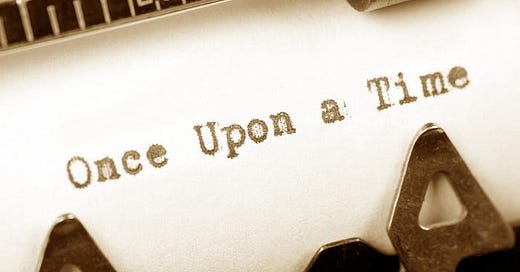Research Hit: Storytelling Changes Your Hormonal Balance (Positively)
One bout of story telling had multiple positive impacts on hormones and positivity
From the archives:
Once upon a time there was a scientist who wanted to know why stories make you feel good. So she researched, and researched, and spoke to storytellers, and poets, and authors.
Then she had an idea:
What if she measured bodily hormonal responses to stories? Would that convince the world that stories are good for individuals and society?
So she put together a project team and applied for a grant (my, oh my, that is another story in itself).
They worked hard, put together protocols, and indeed came up with a pretty cool protocol, they modestly thought, of telling hospitalised children stories and measuring the hormonal and subjective responses.
After they had conducted the experiments — with a control group, of course — they waited patiently for the results. The data stream came in through their statistical analysis software. Would this be good? Would this be a flop? What would the data say?
I’m not sure the above story is actually true and it is changed for dramatic effect. But the fact is a bunch of researchers around Guilherme Bockington (a male not female — I wanted to do my bit to promote women in STEM) in Brazil have recently published a study on the effects of hormonal balances after story telling and the results tell us precisely why we human beings (and I’m sure it’s not just children) enjoy stories and the positive effects these have.
I’m sure you’re itching now to know the results — see, keeping you in suspense like a good storyteller that I am.
The results were fascinating and positive: namely that after this single 30-minute intervention the researchers saw in comparison to a control group that solved riddles with another person instead of hearing a story —this was to also match interpersonal connections and separate only the storytelling aspect:
An increase in oxytocin — oxytocin is considered the bonding chemical which triggers warmth and closeness and positive feelings
A decrease in cortisol — cortisol is considered the stress chemical which is released in stressful situations and can stimulate low level (and high) inflammation
A decrease in subjective pain — whether this is because of one or both of the above is not clear but almost probably strongly related
Positive emotional shifts — probably again because of the hormonal responses
That’s a pretty impressive result from one 30-minute intervention: higher oxytocin, lower cortisol, lower pain, and increased positive emotionality. Better than any drug and almost free and with only positive side effects!
This goes a long way to explain why we like stories as human beings, whether child or adult, and why they are so pervasive and widespread across cultures and society. It is also something professional speakers only know too well — advice I give consistently when I do communication trainings: create a story line.
This shows that we are indeed wired — or at least wired to have strong hormonal and hence visceral responses to stories!
Our hero sat there reading her published paper feeling a sense of satisfaction. She had done the hard work, battled through protocols, statistics, and ethical guidelines, not to mention the peer review process.
How would this be received?
Would she be cited?
What other research could follow from this?
Research into adults maybe, business people even…are they even human…hmmm…so many questions still to answer…
Reference
G. Brockington, A.P. Gomes Moreira, M.S. Buso, et al.
Storytelling increases oxytocin and positive emotions and decreases cortisol and pain in hospitalized children
Proc. Natl. Acad. Sci. U.S.A. 118 (22) e2018409118,
https://doi.org/10.1073/pnas.2018409118 (2021).




